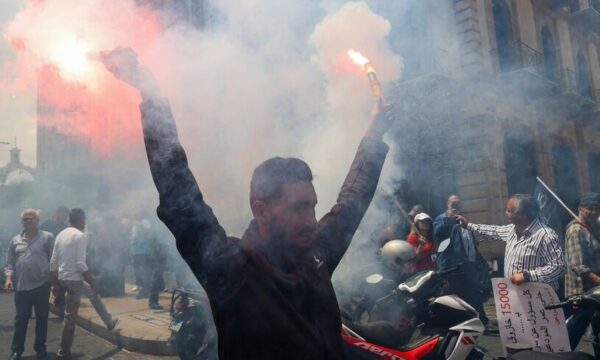Lebanese protesters take part in a demonstration called for by the banks depositors committee against Riad Salameh’s monetary policies, on May 9, 2023. Lebanon’s economic meltdown, described by the World Bank as one of the worst in recent global history, has plunged most of the population into poverty according to the United Nations. (Photo by ANWAR AMRO / AFP) (Photo by ANWAR AMRO/AFP via Getty Images)
By Ya Libnan Editorial Board
Lebanese judge Bilal Halawi ruled Monday that the country’s former central bank chief Riad Salameh will remain in jail while facing charges of embezzling tens of millions of dollars from state offices. Salameh is widely seen as a key culprit in Lebanon’s economic crash, which the World Bank has called one of the worst in recent history. On the other hand the appointment of judges in Lebanon is effectively a political act that often leads to corrupt relationships between judges and the political leaders who appoint them. The question is since the corrupt Lebanese politicians protected Riad Salameh and refused to allow France and Germany to extradite him after the arrest warrant , how can the depositors count on the judicial system to recover their stolen funds
The dilemma depositors raised highlights a significant issue in Lebanon’s justice system, where the judiciary’s independence is compromised by political interference. Given that judges are often appointed based on political affiliations, the judicial process can be influenced by the same corrupt networks that have protected figures like Riad Salameh. This creates a lack of trust in the system among the public, particularly among depositors seeking to recover their stolen funds.
Here are some critical points to consider:
- Lack of Judicial Independence: As long as judicial appointments are subject to political influence, the system remains vulnerable to manipulation by those with power. This undermines the potential for impartiality and accountability in high-profile cases involving powerful figures.
- Political Protection and Immunity: Corrupt politicians often shield each other from accountability, as seen in the refusal to extradite Salameh to France and Germany despite arrest warrants. This protection is a barrier to justice, making it difficult for depositors to see their funds recovered through legal avenues.
- International Pressure and Oversight: To counterbalance the compromised judicial system, international pressure and oversight might be necessary. This could include leveraging international legal mechanisms, such as the European Human Rights Court or other international bodies, to apply pressure on Lebanon to uphold the rule of law.
- Civil Society and Activism: Lebanese civil society, including advocacy groups, journalists, and protest movements, play a crucial role in keeping the pressure on the judiciary and political leaders. Their efforts can help to expose corruption, rally public opinion, and demand reforms.
- Judicial Reform: For long-term solutions, judicial reforms are essential. This involves restructuring the judicial appointment process to ensure independence, increasing transparency, and implementing measures that hold judges and politicians accountable for corrupt practices.
- Alternative Legal Avenues: Depositors may explore alternative legal avenues, such as class-action lawsuits or international arbitration, to seek redress outside Lebanon’s compromised judiciary. However, these are often complex, costly, and require international legal expertise.
In essence, while the current judicial system in Lebanon may not inspire confidence among depositors, ongoing pressure for reforms and the engagement of international bodies could provide some hope for accountability and the recovery of stolen funds. The key lies in breaking the cycle of corruption that ties political leaders and the judiciary together, thereby paving the way for genuine justice and restitution.


Leave a Reply
You must be logged in to post a comment.